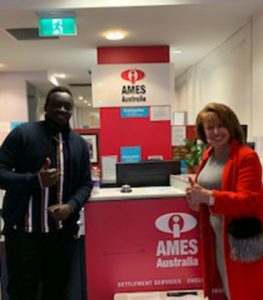Speeding up refugee and migrant settlement journeys
An innovative new program is fast-tracking refugee and migrant jobseekers into work while also speeding up their settlement journeys and supporting them to build connections into the broader society.
The Individualised Pathway Plan (IPP) ) Building Skills to Work Program has had great success, even during the COVID-19 lockdown, in supporting newly arrived refugees to find meaningful and sustainable employment.
 The initiative, developed by migrant and refugee settlement agency AMES Australia, is also establishing pathways to help new arrivals achieve their longer term settlement goals through education, training and experience in the workplace.
The initiative, developed by migrant and refugee settlement agency AMES Australia, is also establishing pathways to help new arrivals achieve their longer term settlement goals through education, training and experience in the workplace.
It was designed to better co-ordinate services supporting new arrivals and sees AMES’ settlement, education and employment staff working together more closely to achieve positive outcomes for clients.
More than 100 AMES Australia IPP clients were supported to find work during the COVID-19 lockdown in Melbourne. For many of these people, the program has helped them secure the all-important first job in Australia which helps them further develop their English, achieve financial independence and a better understanding of Australian workplace culture.
Dozens more have been guided on to educational and training pathways through the program.
AMES Australia CEO Cath Scarth says the IPP program provides a wrap-around service that see the settlement, education and employment service offerings brought together to make refugee and migrant settlement journeys faster and better.
“IPP amounts to having our suite of services provided to clients in an integrated and holistic way which creates a tailored pathway for each person based on their individual strengths and barriers,” Ms Scarth said.
“The IPP team works with refugees and migrants to identify their goals and aspirations and then put in place strategies and pathway to achieving those aspirations,” she said.
“It also assists newly arrived refugees migrants in learning how to apply their skills and experience in the workplace, find opportunities to upskill or reskill in the Australian labor market and navigate the job market,” Ms Scarth said.
Iranian refugee Armin Bakhshi secured work just months after arriving in Australia with limited English thanks to the IPP.
Armin and his family arrived in Australia in September 2019 on a humanitarian visa. In Iran, he was persecuted over political issues. As a result, he had few employment opportunities there but he spent six years as a displaced person in Turkey, where he worked servicing air conditioners.
Armin was placed in the IPP Building Skills Program and supported by settlement workers based at AMES Australia’ Noble Park site, in Melbourne’s south east.
He was focusing on his English and was a full time student but the IPP program gave him the opportunity to start thinking about potential work pathways.
His experience in Turkey meant he had good mechanical skills, so he was referred to a Certificate II course in Electrical Technology at the Chisolm Institute.
In the meantime, Armin has been supported to find a job in food services. AMES staff assisted him gaining an ABN and Tax File Number and the required licences.
He is keen to improve his English through customer service exposure and move on with his life.
“I am very happy to have a job and I’m planning to move on with my life in Australia. AMES has been very helpful to me,” Armin said.
“I want to continue my studies and become an electrician so I can get a job that is full time so that I can build a new life for my family,” he said.
Burundian refugee Kevin Niyonsaba has also gained employment after joining AMES Australia’s IPP-Building Skills for Work Success program
Through the IPP Kevin completed several work readiness courses and landed a job as a process worker.
Kevin took part in the Refugee Mentoring Program as part of the IPP which equipped him with workplace knowledge and job search skills as well as career planning and pathway in order to identify gaps between employer expectations and his strengths.
Young refugee Sheroze Labib was supported through the IPP to get a driver’s licence and ultimately a job.
Through the IPP program, Sharoze was able to access free driving lessons.
He was also supported to prepare a resume so he could apply for a job. He had previously worked in the hospitality and food and beverage industry in Pakistan.
With a licence and through AMES Australia’s IPP scheme, Sheroze was able to find casual work in a factory but he is now keen to find a full-time job.












